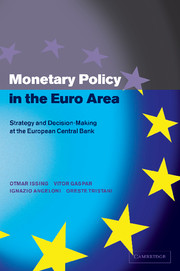Book contents
- Frontmatter
- Contents
- List of figures
- List of tables
- Acknowledgements
- Introduction
- 1 Money, output and prices: the scope of monetary policy
- 2 Monetary policy making: strategies and rules
- 3 The euro area: an overview
- 4 The ECB strategy: defining price stability
- 5 The role of money
- 6 A broadly based assessment
- 7 The ECB strategy: an overall view
- 8 The operational framework
- 9 Accountability and transparency
- 10 The single monetary policy in 1999
- Appendix Excerpts from ECB external communications to the press
- References
- Index
6 - A broadly based assessment
Published online by Cambridge University Press: 22 September 2009
- Frontmatter
- Contents
- List of figures
- List of tables
- Acknowledgements
- Introduction
- 1 Money, output and prices: the scope of monetary policy
- 2 Monetary policy making: strategies and rules
- 3 The euro area: an overview
- 4 The ECB strategy: defining price stability
- 5 The role of money
- 6 A broadly based assessment
- 7 The ECB strategy: an overall view
- 8 The operational framework
- 9 Accountability and transparency
- 10 The single monetary policy in 1999
- Appendix Excerpts from ECB external communications to the press
- References
- Index
Summary
In chapter 5 it was argued that the relation between money and prices in the long run justifies a special role for the analysis of monetary developments in the context of the ECB's strategy. Nevertheless, monetary developments do not exhaust analysis within the strategy: a wide array of models and indicators contribute to define the relevant information.
Given the long run relationship between money and prices, monitoring monetary developments would certainly provide the economy with a nominal anchor. Other factors, however, will influence inflation in the shorter run. The analysis of these developments, including the possibility to respond to them, can improve the efficiency with which price stability is achieved and also ensure that temporary inflationary or deflationary pressures do not become entrenched in the economy.
The range of relevant indicators, and their relative importance, change over time. Consequently, there is no permanently valid way to organise the assessment in a logically consistent manner. For purposes of exposition, we have divided this chapter into two sections. In the first, we describe the analysis of a range of economic variables that have leading indicator properties on inflation in the short to medium term. These, in turn, are organised under four headings: (a) ‘gap’ measures; (b) measures of cost pressure; (c) international prices and exchange rates; and (d) other asset prices. Finally, we mention the analysis of current price developments, which also has an important role in practical monetary policy making.
- Type
- Chapter
- Information
- Monetary Policy in the Euro AreaStrategy and Decision-Making at the European Central Bank, pp. 90 - 97Publisher: Cambridge University PressPrint publication year: 2001

